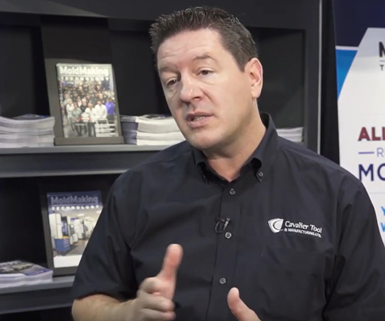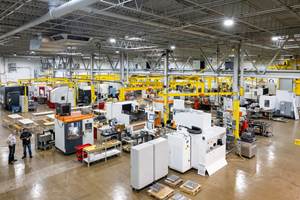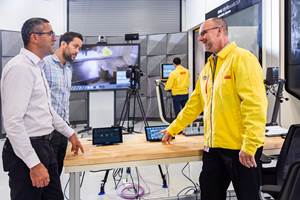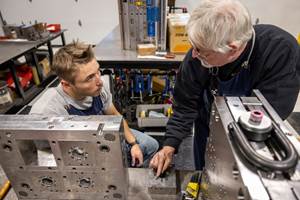A Unique Approach to Filling Specific Workforce Needs
Editorial Director Christina Fuges and Cavalier Tool & Mfg.’s President Brian Bendig discuss how the shop has successfully eliminated their mold design bottleneck by filling specific workforce needs.
Share
Read Next
Most mold manufacturers are faced with the challenge of finding skilled and motivated talent. But for some, the need is even more specific than that.
MoldMaking Technology Editorial Director Christina Fuges had the chance to discuss this issue with Brian Bendig, president of Canadian mold builder Cavalier Tool and Manufacturing about their specific workforce need and the unique way they solve that challenge.
Watch the video below or read the transcript to see what Bendig had to share about how his company handles this challenge.

Brian Bendig: So design has always been a bottleneck at Cavalier. We often joke, we say our customer is the first bottleneck, the second being design. And why is that? Designs, part development, product it's typically late. It's not always finished. So it's going stop, go and stop. And it really creates a lot of problems. When we're looking at efficiencies and running a very efficient business, we want those designs to be done so that we can very quickly do, you know, numerous operations at any given time on any block for any reason.
So this design becomes very important, and our goal was to have a completed design to not exceed 40% of quoted lead time. In doing that, you know, there's a big stress in this design department. So we struggled we worked with other shops, we worked with other design houses, different things that were outside and it just didn't work.
So we took a different approach. We went to India and we actually leased our own building, and we opened up our own division within India. So, they are our people. They wear the Cavalier shirts, they're on the Cavalier team and they work specifically for Cavalier, and this is complementary to us. And some of the benefits is they speak very good English, they're very dedicated, very hardworking individuals, and we've got that time zone shift, so we can come in the morning and overlap four or five hours and then we worked our five o'clock at night. We drop off and they come back in. So that allows us to further reduce that lead time. We're putting more hours in in a shorter period of time. So it helps us achieve that 40% goal, which in turn makes us far more efficient in the production of our molds.
Bendig: We like to be a little bit different than everyone else, so a lot of our competitors focus primarily on the automotive markets. We have a blended content, and we do things a little bit differently, so we're not only looking for the common projects, but we're looking for some of the complex projects. The projects that are off the tracks, the things that are going sideways things, that are maybe more difficult or complex, the projects that other people don't want. We want to be that Tylenol, we want it to be pain free. So we focus on those problematic stuff, and we excel at those things. That pushes us further and further from some of our competition, and it makes us stand out.
We often want to invite a lot of the young adults within the industry, and awareness is a big thing because of the shortage of skilled workers and such is problematic in our industry. A lot of people know what a dentist says a doctor does different things because they can see it, they can touch it, they're familiar. But people don't know what we do, so we like to include a lot of the young adults through our building for tours and such.
In doing this, we went a little bit further, and we actually developed our own math program. We had put together several items that we could measure with go/no-go pins, micrometers, etc. We set up this math program and invited a bunch of the students. We were working with these young adults going through this program, and in turn, these schools are adopting this. Now we’re nudging them to be a little more aggressive, to get a little bit more involved, to go a little bit deeper and more industry-specific.
These are some of the the skills or tools needed to be successful in working with us. We're working with the Canadian Association of Mold Makers (CAMM), and they are taking some of the things we're doing and going to some of their partners and connections to further push that out and get more involvement. When they're working with a school, there's more awareness and there's a bigger focus.
See more interviews and demonstrations videos from last year’s Amerimold, and be sure to check out all the exciting things in store for this year’s show!
Related Content
Cross Training, In-House Capabilities and Collaborative Design Move Helm Tool Forward
Cross-training, bringing it all in-house, molding and collaborative design are essential to Helm Tool's success.
Read MoreTackling a Mold Designer Shortage
Survey findings reveal a shortage of skilled mold designers and engineers in the moldmaking community, calling for intervention through educational programs and exploration of training alternatives while seeking input from those who have addressed the issue successfully.
Read MoreHow to Use Continuing Education to Remain Competitive in Moldmaking
Continued training helps moldmakers make tooling decisions and properly use the latest cutting tool to efficiently machine high-quality molds.
Read MoreEden Tool and Eden Manufacturing: A Story of Resilience, Growth and Innovation
This critical parts manufacturer, founded on solid tooling fundamentals, didn’t get derailed with the unexpected passing of the owner because leadership was already building a solid business, not just a good tool shop. Here’s how they managed change incrementally… and they’re not finished yet.
Read MoreRead Next
How to Use Strategic Planning Tools, Data to Manage the Human Side of Business
Q&A with Marion Wells, MMT EAB member and founder of Human Asset Management.
Read MoreAre You a Moldmaker Considering 3D Printing? Consider the 3D Printing Workshop at NPE2024
Presentations will cover 3D printing for mold tooling, material innovation, product development, bridge production and full-scale, high-volume additive manufacturing.
Read MoreHow to Use Continuing Education to Remain Competitive in Moldmaking
Continued training helps moldmakers make tooling decisions and properly use the latest cutting tool to efficiently machine high-quality molds.
Read More






















